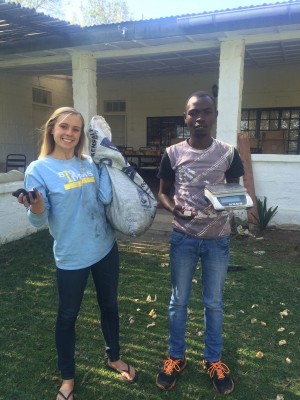
Here in the U.S., we take flushing toilets for granted, but around the world 2.5 billion people lack access to improved sanitation. In fact, more people have cell phones than have toilets. This is especially true in the developing world. And in urbanizing communities, if you don’t have a toilet, the options are fairly grim: use communal pit latrines, drop one in the open, or use a “flying toilet” (which means pooping in a bag and literally tossing it into the bushes). And think about the logistics (and fear) involved when using any of these options in the dead of night—especially for women, children, and the elderly or disabled. (Also, consider the possibility of going out at night and being hit by a flying bag of poop!)
Sanivation, a social enterprise based in East Africa, is turning this challenge into an opportunity by providing affordable, dignified sanitation—with a twist. Catherine Berner, the organization’s technical lead, spoke in the Innovation Zone at AU Las Vegas, explaining that they view the global sanitation crisis as a market failure—which means a market-based approach is needed to solve it. Sanivation’s solution creates multiple sources of revenue. First, they rent out portable toilets to families in developing communities for an affordable monthly fee. Then they collect the waste and transform it into fuel.
“We use solar-thermal energy to heat feces, which inactivates pathogens and makes it safe for use—much like how you would pasteurize milk,” explains Berner.
The process transforms human waste into charcoal briquettes, just like the ones you use in your barbeque. “Most people in Kenya cook with solid fuel,” Berner says. “Our briquettes have lower emissions and burn longer than traditional charcoal.” Properly disposing of waste also reduces the risk of disease for individual households and the entire community.
Plus, it’s so much more dignified.
Berner says this is just the first step towards solving the global sanitation crisis. Sanivation has partnered with the Autodesk Foundation to improve their toilet designs, enhance their treatment processes, and grow their business, with plans to reach a million users in the next 5 years.
To learn more, check out Berner’s Innovation Zone presentation.
Buy your discounted tickets now for AU 2017 and register later!



